Comprehensive Assessment and Management Model for Elderly Patients
VerifiedAdded on 2022/12/15
|10
|3062
|165
Report
AI Summary
This report presents a case study applying the systematic geriatric appraisal (CGA) model to an elderly woman with diabetes and a history of hypoglycemic episodes. It details the assessment, which includes functional capacity, medical history, frailty screening, mental capacity, psychological well-being, and social history, leading to a care plan addressing reduced function, medical history, and potential risks. The report discusses immediate and long-term care plans, emphasizing person-centered care, medication management using the START principle, and the challenges faced by healthcare professionals in providing optimal care to older adults. It highlights the importance of addressing frailty, polypharmacy, and the need for evidence-based practice and clinical guidelines to improve health outcomes and overall well-being. The report emphasizes the need for effective management plans and the role of geriatric nursing in supporting person-centered care within a multidisciplinary team, with a focus on providing better health and social care to patients.
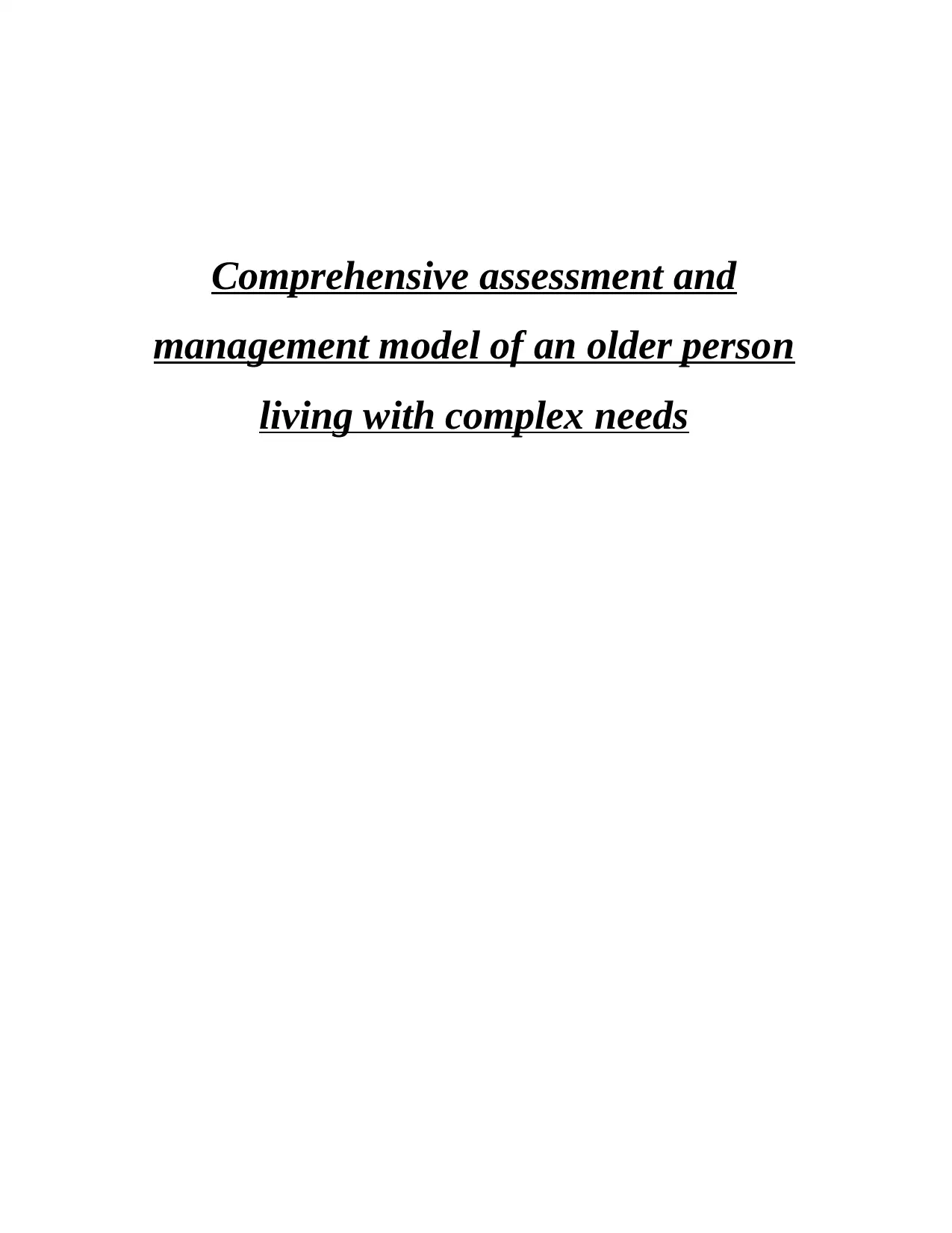
Comprehensive assessment and
management model of an older person
living with complex needs
management model of an older person
living with complex needs
Paraphrase This Document
Need a fresh take? Get an instant paraphrase of this document with our AI Paraphraser
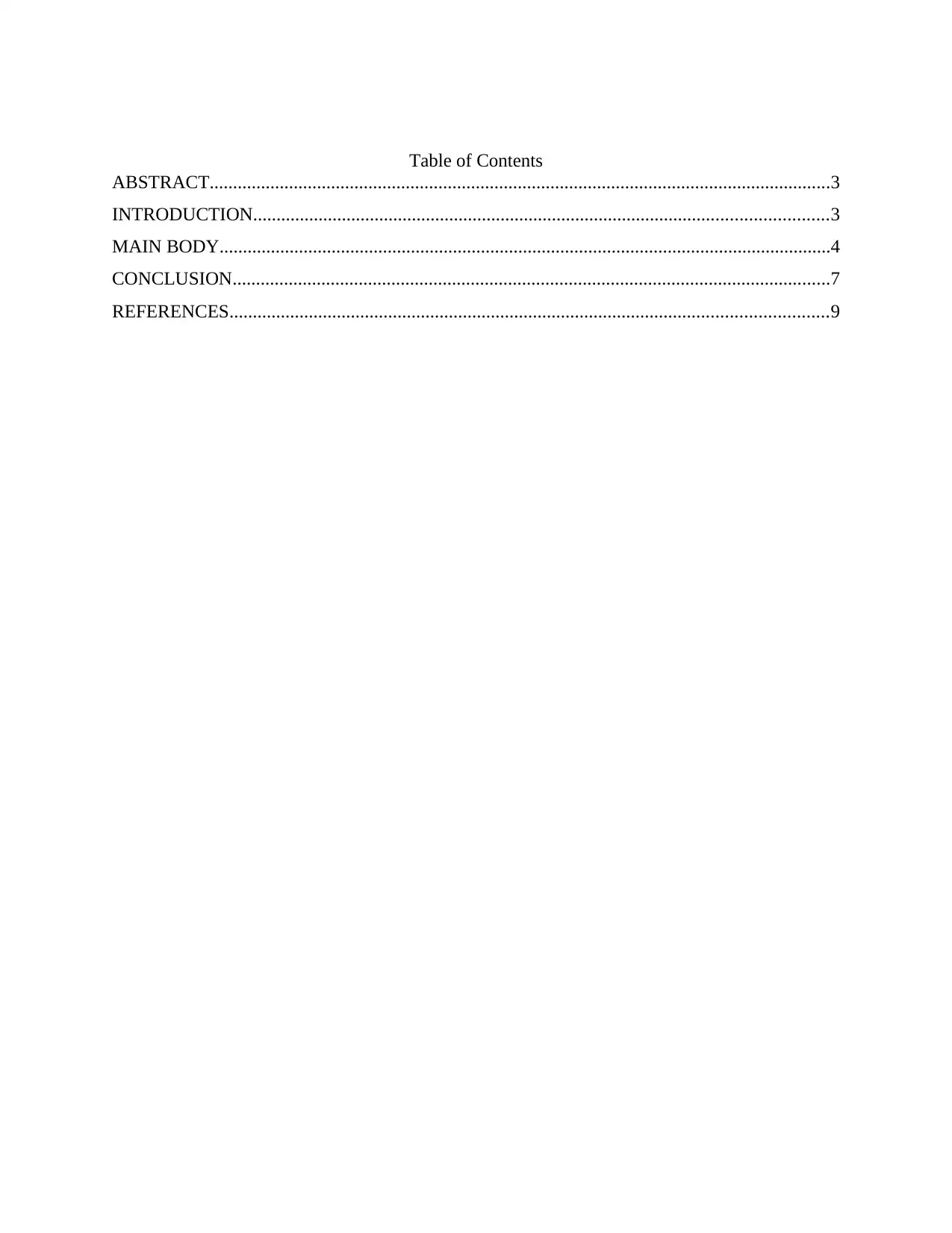
Table of Contents
ABSTRACT.....................................................................................................................................3
INTRODUCTION...........................................................................................................................3
MAIN BODY...................................................................................................................................4
CONCLUSION................................................................................................................................7
REFERENCES................................................................................................................................9
ABSTRACT.....................................................................................................................................3
INTRODUCTION...........................................................................................................................3
MAIN BODY...................................................................................................................................4
CONCLUSION................................................................................................................................7
REFERENCES................................................................................................................................9
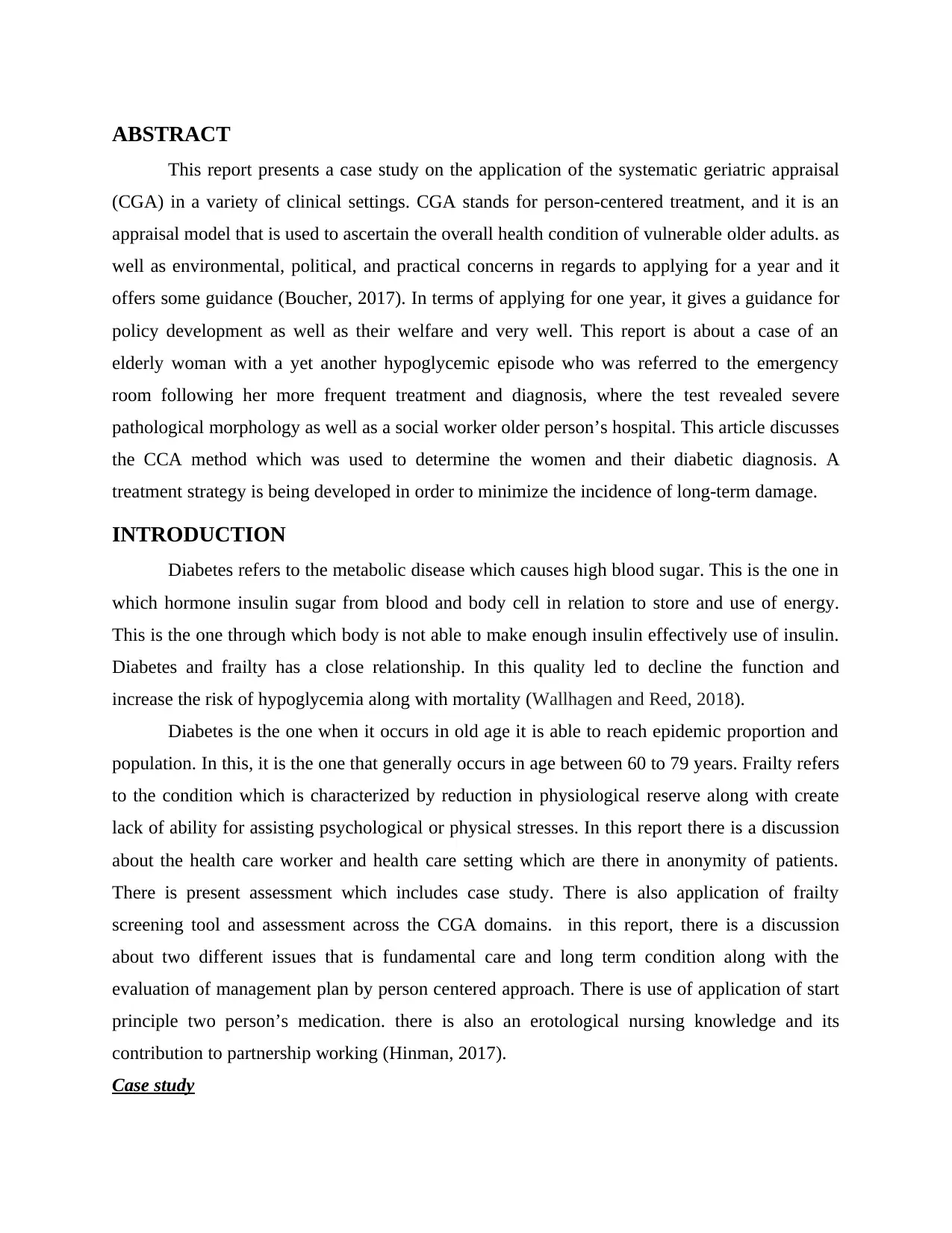
ABSTRACT
This report presents a case study on the application of the systematic geriatric appraisal
(CGA) in a variety of clinical settings. CGA stands for person-centered treatment, and it is an
appraisal model that is used to ascertain the overall health condition of vulnerable older adults. as
well as environmental, political, and practical concerns in regards to applying for a year and it
offers some guidance (Boucher, 2017). In terms of applying for one year, it gives a guidance for
policy development as well as their welfare and very well. This report is about a case of an
elderly woman with a yet another hypoglycemic episode who was referred to the emergency
room following her more frequent treatment and diagnosis, where the test revealed severe
pathological morphology as well as a social worker older person’s hospital. This article discusses
the CCA method which was used to determine the women and their diabetic diagnosis. A
treatment strategy is being developed in order to minimize the incidence of long-term damage.
INTRODUCTION
Diabetes refers to the metabolic disease which causes high blood sugar. This is the one in
which hormone insulin sugar from blood and body cell in relation to store and use of energy.
This is the one through which body is not able to make enough insulin effectively use of insulin.
Diabetes and frailty has a close relationship. In this quality led to decline the function and
increase the risk of hypoglycemia along with mortality (Wallhagen and Reed, 2018).
Diabetes is the one when it occurs in old age it is able to reach epidemic proportion and
population. In this, it is the one that generally occurs in age between 60 to 79 years. Frailty refers
to the condition which is characterized by reduction in physiological reserve along with create
lack of ability for assisting psychological or physical stresses. In this report there is a discussion
about the health care worker and health care setting which are there in anonymity of patients.
There is present assessment which includes case study. There is also application of frailty
screening tool and assessment across the CGA domains. in this report, there is a discussion
about two different issues that is fundamental care and long term condition along with the
evaluation of management plan by person centered approach. There is use of application of start
principle two person’s medication. there is also an erotological nursing knowledge and its
contribution to partnership working (Hinman, 2017).
Case study
This report presents a case study on the application of the systematic geriatric appraisal
(CGA) in a variety of clinical settings. CGA stands for person-centered treatment, and it is an
appraisal model that is used to ascertain the overall health condition of vulnerable older adults. as
well as environmental, political, and practical concerns in regards to applying for a year and it
offers some guidance (Boucher, 2017). In terms of applying for one year, it gives a guidance for
policy development as well as their welfare and very well. This report is about a case of an
elderly woman with a yet another hypoglycemic episode who was referred to the emergency
room following her more frequent treatment and diagnosis, where the test revealed severe
pathological morphology as well as a social worker older person’s hospital. This article discusses
the CCA method which was used to determine the women and their diabetic diagnosis. A
treatment strategy is being developed in order to minimize the incidence of long-term damage.
INTRODUCTION
Diabetes refers to the metabolic disease which causes high blood sugar. This is the one in
which hormone insulin sugar from blood and body cell in relation to store and use of energy.
This is the one through which body is not able to make enough insulin effectively use of insulin.
Diabetes and frailty has a close relationship. In this quality led to decline the function and
increase the risk of hypoglycemia along with mortality (Wallhagen and Reed, 2018).
Diabetes is the one when it occurs in old age it is able to reach epidemic proportion and
population. In this, it is the one that generally occurs in age between 60 to 79 years. Frailty refers
to the condition which is characterized by reduction in physiological reserve along with create
lack of ability for assisting psychological or physical stresses. In this report there is a discussion
about the health care worker and health care setting which are there in anonymity of patients.
There is present assessment which includes case study. There is also application of frailty
screening tool and assessment across the CGA domains. in this report, there is a discussion
about two different issues that is fundamental care and long term condition along with the
evaluation of management plan by person centered approach. There is use of application of start
principle two person’s medication. there is also an erotological nursing knowledge and its
contribution to partnership working (Hinman, 2017).
Case study
⊘ This is a preview!⊘
Do you want full access?
Subscribe today to unlock all pages.

Trusted by 1+ million students worldwide
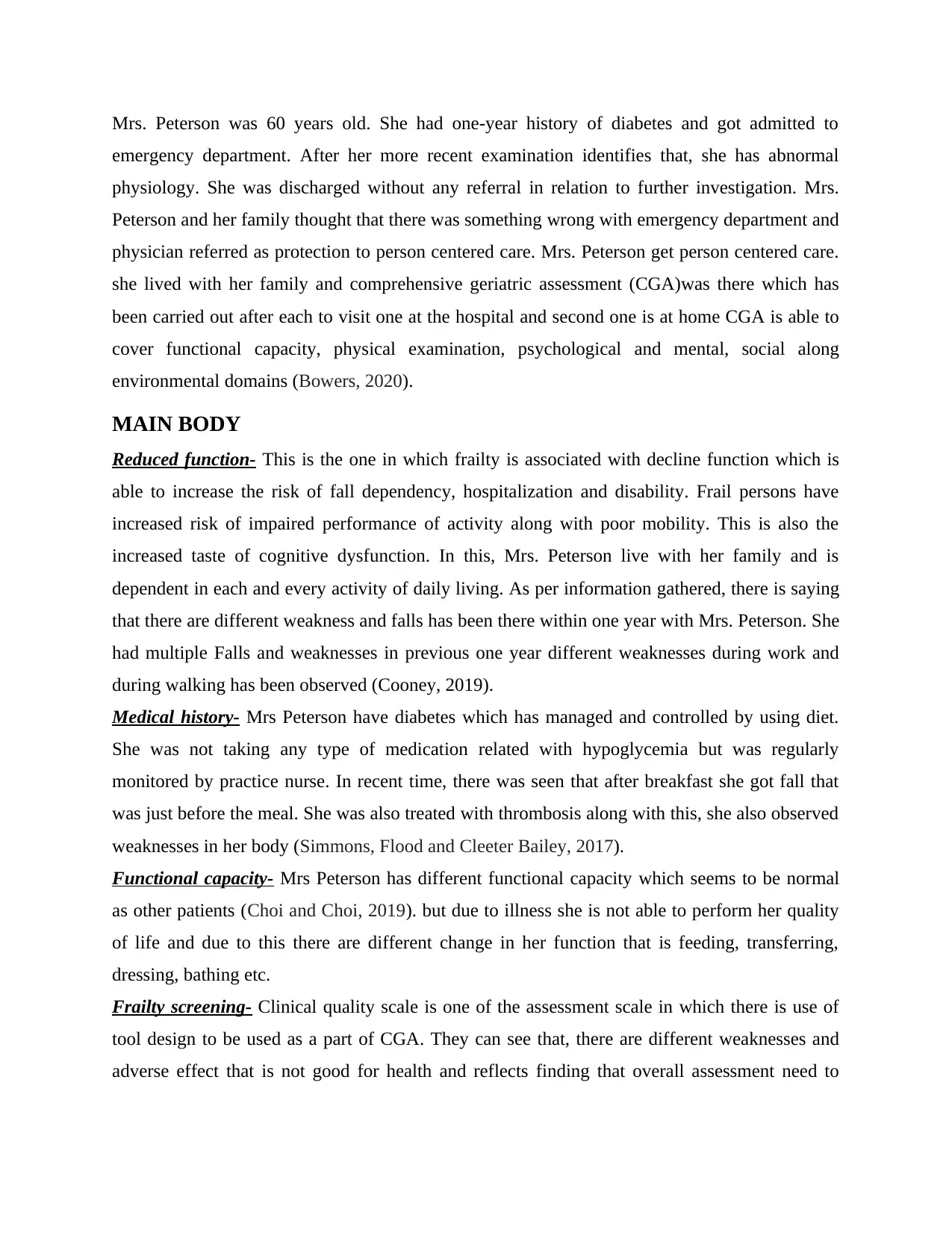
Mrs. Peterson was 60 years old. She had one-year history of diabetes and got admitted to
emergency department. After her more recent examination identifies that, she has abnormal
physiology. She was discharged without any referral in relation to further investigation. Mrs.
Peterson and her family thought that there was something wrong with emergency department and
physician referred as protection to person centered care. Mrs. Peterson get person centered care.
she lived with her family and comprehensive geriatric assessment (CGA)was there which has
been carried out after each to visit one at the hospital and second one is at home CGA is able to
cover functional capacity, physical examination, psychological and mental, social along
environmental domains (Bowers, 2020).
MAIN BODY
Reduced function- This is the one in which frailty is associated with decline function which is
able to increase the risk of fall dependency, hospitalization and disability. Frail persons have
increased risk of impaired performance of activity along with poor mobility. This is also the
increased taste of cognitive dysfunction. In this, Mrs. Peterson live with her family and is
dependent in each and every activity of daily living. As per information gathered, there is saying
that there are different weakness and falls has been there within one year with Mrs. Peterson. She
had multiple Falls and weaknesses in previous one year different weaknesses during work and
during walking has been observed (Cooney, 2019).
Medical history- Mrs Peterson have diabetes which has managed and controlled by using diet.
She was not taking any type of medication related with hypoglycemia but was regularly
monitored by practice nurse. In recent time, there was seen that after breakfast she got fall that
was just before the meal. She was also treated with thrombosis along with this, she also observed
weaknesses in her body (Simmons, Flood and Cleeter Bailey, 2017).
Functional capacity- Mrs Peterson has different functional capacity which seems to be normal
as other patients (Choi and Choi, 2019). but due to illness she is not able to perform her quality
of life and due to this there are different change in her function that is feeding, transferring,
dressing, bathing etc.
Frailty screening- Clinical quality scale is one of the assessment scale in which there is use of
tool design to be used as a part of CGA. They can see that, there are different weaknesses and
adverse effect that is not good for health and reflects finding that overall assessment need to
emergency department. After her more recent examination identifies that, she has abnormal
physiology. She was discharged without any referral in relation to further investigation. Mrs.
Peterson and her family thought that there was something wrong with emergency department and
physician referred as protection to person centered care. Mrs. Peterson get person centered care.
she lived with her family and comprehensive geriatric assessment (CGA)was there which has
been carried out after each to visit one at the hospital and second one is at home CGA is able to
cover functional capacity, physical examination, psychological and mental, social along
environmental domains (Bowers, 2020).
MAIN BODY
Reduced function- This is the one in which frailty is associated with decline function which is
able to increase the risk of fall dependency, hospitalization and disability. Frail persons have
increased risk of impaired performance of activity along with poor mobility. This is also the
increased taste of cognitive dysfunction. In this, Mrs. Peterson live with her family and is
dependent in each and every activity of daily living. As per information gathered, there is saying
that there are different weakness and falls has been there within one year with Mrs. Peterson. She
had multiple Falls and weaknesses in previous one year different weaknesses during work and
during walking has been observed (Cooney, 2019).
Medical history- Mrs Peterson have diabetes which has managed and controlled by using diet.
She was not taking any type of medication related with hypoglycemia but was regularly
monitored by practice nurse. In recent time, there was seen that after breakfast she got fall that
was just before the meal. She was also treated with thrombosis along with this, she also observed
weaknesses in her body (Simmons, Flood and Cleeter Bailey, 2017).
Functional capacity- Mrs Peterson has different functional capacity which seems to be normal
as other patients (Choi and Choi, 2019). but due to illness she is not able to perform her quality
of life and due to this there are different change in her function that is feeding, transferring,
dressing, bathing etc.
Frailty screening- Clinical quality scale is one of the assessment scale in which there is use of
tool design to be used as a part of CGA. They can see that, there are different weaknesses and
adverse effect that is not good for health and reflects finding that overall assessment need to
Paraphrase This Document
Need a fresh take? Get an instant paraphrase of this document with our AI Paraphraser
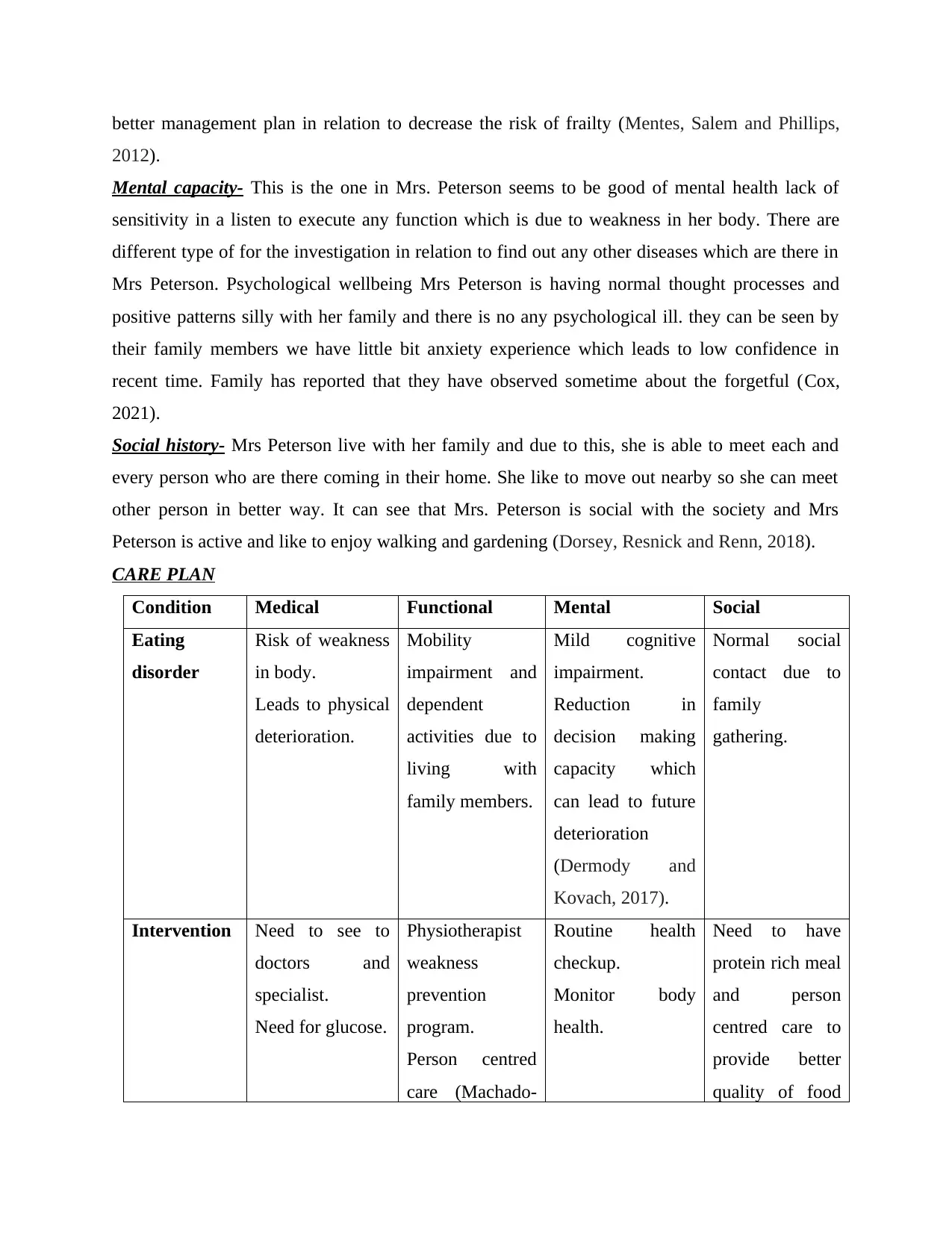
better management plan in relation to decrease the risk of frailty (Mentes, Salem and Phillips,
2012).
Mental capacity- This is the one in Mrs. Peterson seems to be good of mental health lack of
sensitivity in a listen to execute any function which is due to weakness in her body. There are
different type of for the investigation in relation to find out any other diseases which are there in
Mrs Peterson. Psychological wellbeing Mrs Peterson is having normal thought processes and
positive patterns silly with her family and there is no any psychological ill. they can be seen by
their family members we have little bit anxiety experience which leads to low confidence in
recent time. Family has reported that they have observed sometime about the forgetful (Cox,
2021).
Social history- Mrs Peterson live with her family and due to this, she is able to meet each and
every person who are there coming in their home. She like to move out nearby so she can meet
other person in better way. It can see that Mrs. Peterson is social with the society and Mrs
Peterson is active and like to enjoy walking and gardening (Dorsey, Resnick and Renn, 2018).
CARE PLAN
Condition Medical Functional Mental Social
Eating
disorder
Risk of weakness
in body.
Leads to physical
deterioration.
Mobility
impairment and
dependent
activities due to
living with
family members.
Mild cognitive
impairment.
Reduction in
decision making
capacity which
can lead to future
deterioration
(Dermody and
Kovach, 2017).
Normal social
contact due to
family
gathering.
Intervention Need to see to
doctors and
specialist.
Need for glucose.
Physiotherapist
weakness
prevention
program.
Person centred
care (Machado-
Routine health
checkup.
Monitor body
health.
Need to have
protein rich meal
and person
centred care to
provide better
quality of food
2012).
Mental capacity- This is the one in Mrs. Peterson seems to be good of mental health lack of
sensitivity in a listen to execute any function which is due to weakness in her body. There are
different type of for the investigation in relation to find out any other diseases which are there in
Mrs Peterson. Psychological wellbeing Mrs Peterson is having normal thought processes and
positive patterns silly with her family and there is no any psychological ill. they can be seen by
their family members we have little bit anxiety experience which leads to low confidence in
recent time. Family has reported that they have observed sometime about the forgetful (Cox,
2021).
Social history- Mrs Peterson live with her family and due to this, she is able to meet each and
every person who are there coming in their home. She like to move out nearby so she can meet
other person in better way. It can see that Mrs. Peterson is social with the society and Mrs
Peterson is active and like to enjoy walking and gardening (Dorsey, Resnick and Renn, 2018).
CARE PLAN
Condition Medical Functional Mental Social
Eating
disorder
Risk of weakness
in body.
Leads to physical
deterioration.
Mobility
impairment and
dependent
activities due to
living with
family members.
Mild cognitive
impairment.
Reduction in
decision making
capacity which
can lead to future
deterioration
(Dermody and
Kovach, 2017).
Normal social
contact due to
family
gathering.
Intervention Need to see to
doctors and
specialist.
Need for glucose.
Physiotherapist
weakness
prevention
program.
Person centred
care (Machado-
Routine health
checkup.
Monitor body
health.
Need to have
protein rich meal
and person
centred care to
provide better
quality of food
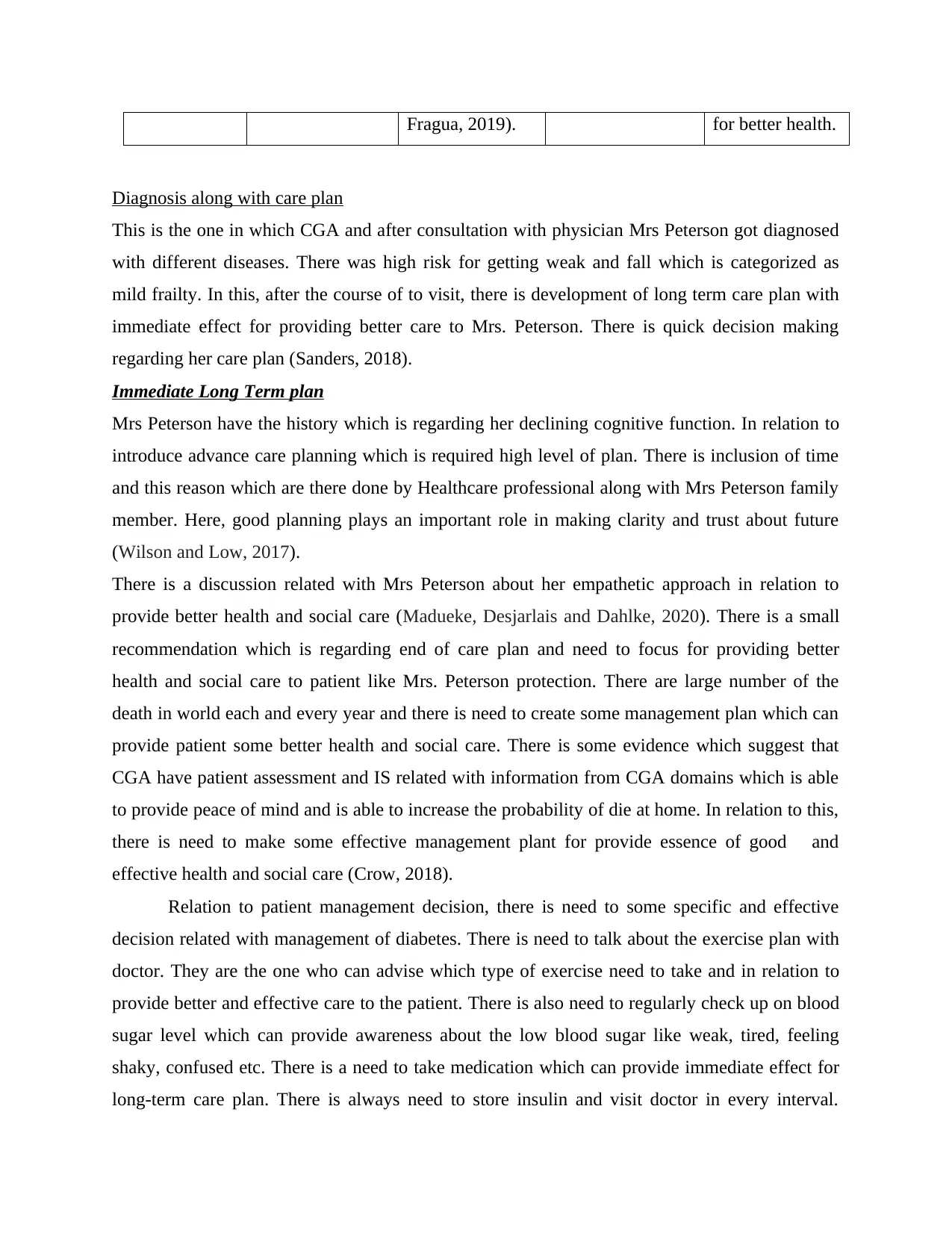
Fragua, 2019). for better health.
Diagnosis along with care plan
This is the one in which CGA and after consultation with physician Mrs Peterson got diagnosed
with different diseases. There was high risk for getting weak and fall which is categorized as
mild frailty. In this, after the course of to visit, there is development of long term care plan with
immediate effect for providing better care to Mrs. Peterson. There is quick decision making
regarding her care plan (Sanders, 2018).
Immediate Long Term plan
Mrs Peterson have the history which is regarding her declining cognitive function. In relation to
introduce advance care planning which is required high level of plan. There is inclusion of time
and this reason which are there done by Healthcare professional along with Mrs Peterson family
member. Here, good planning plays an important role in making clarity and trust about future
(Wilson and Low, 2017).
There is a discussion related with Mrs Peterson about her empathetic approach in relation to
provide better health and social care (Madueke, Desjarlais and Dahlke, 2020). There is a small
recommendation which is regarding end of care plan and need to focus for providing better
health and social care to patient like Mrs. Peterson protection. There are large number of the
death in world each and every year and there is need to create some management plan which can
provide patient some better health and social care. There is some evidence which suggest that
CGA have patient assessment and IS related with information from CGA domains which is able
to provide peace of mind and is able to increase the probability of die at home. In relation to this,
there is need to make some effective management plant for provide essence of good and
effective health and social care (Crow, 2018).
Relation to patient management decision, there is need to some specific and effective
decision related with management of diabetes. There is need to talk about the exercise plan with
doctor. They are the one who can advise which type of exercise need to take and in relation to
provide better and effective care to the patient. There is also need to regularly check up on blood
sugar level which can provide awareness about the low blood sugar like weak, tired, feeling
shaky, confused etc. There is a need to take medication which can provide immediate effect for
long-term care plan. There is always need to store insulin and visit doctor in every interval.
Diagnosis along with care plan
This is the one in which CGA and after consultation with physician Mrs Peterson got diagnosed
with different diseases. There was high risk for getting weak and fall which is categorized as
mild frailty. In this, after the course of to visit, there is development of long term care plan with
immediate effect for providing better care to Mrs. Peterson. There is quick decision making
regarding her care plan (Sanders, 2018).
Immediate Long Term plan
Mrs Peterson have the history which is regarding her declining cognitive function. In relation to
introduce advance care planning which is required high level of plan. There is inclusion of time
and this reason which are there done by Healthcare professional along with Mrs Peterson family
member. Here, good planning plays an important role in making clarity and trust about future
(Wilson and Low, 2017).
There is a discussion related with Mrs Peterson about her empathetic approach in relation to
provide better health and social care (Madueke, Desjarlais and Dahlke, 2020). There is a small
recommendation which is regarding end of care plan and need to focus for providing better
health and social care to patient like Mrs. Peterson protection. There are large number of the
death in world each and every year and there is need to create some management plan which can
provide patient some better health and social care. There is some evidence which suggest that
CGA have patient assessment and IS related with information from CGA domains which is able
to provide peace of mind and is able to increase the probability of die at home. In relation to this,
there is need to make some effective management plant for provide essence of good and
effective health and social care (Crow, 2018).
Relation to patient management decision, there is need to some specific and effective
decision related with management of diabetes. There is need to talk about the exercise plan with
doctor. They are the one who can advise which type of exercise need to take and in relation to
provide better and effective care to the patient. There is also need to regularly check up on blood
sugar level which can provide awareness about the low blood sugar like weak, tired, feeling
shaky, confused etc. There is a need to take medication which can provide immediate effect for
long-term care plan. There is always need to store insulin and visit doctor in every interval.
⊘ This is a preview!⊘
Do you want full access?
Subscribe today to unlock all pages.

Trusted by 1+ million students worldwide
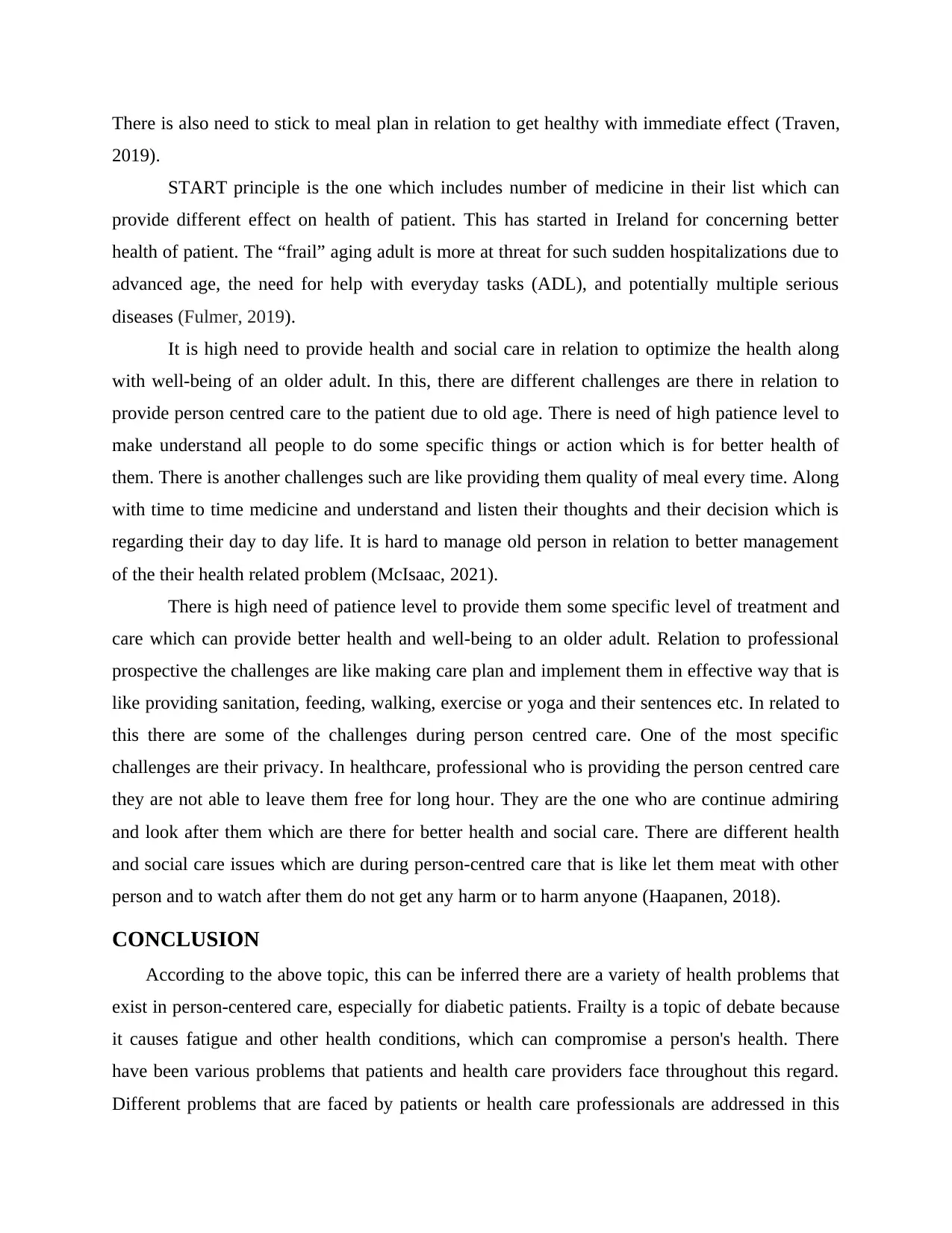
There is also need to stick to meal plan in relation to get healthy with immediate effect (Traven,
2019).
START principle is the one which includes number of medicine in their list which can
provide different effect on health of patient. This has started in Ireland for concerning better
health of patient. The “frail” aging adult is more at threat for such sudden hospitalizations due to
advanced age, the need for help with everyday tasks (ADL), and potentially multiple serious
diseases (Fulmer, 2019).
It is high need to provide health and social care in relation to optimize the health along
with well-being of an older adult. In this, there are different challenges are there in relation to
provide person centred care to the patient due to old age. There is need of high patience level to
make understand all people to do some specific things or action which is for better health of
them. There is another challenges such are like providing them quality of meal every time. Along
with time to time medicine and understand and listen their thoughts and their decision which is
regarding their day to day life. It is hard to manage old person in relation to better management
of the their health related problem (McIsaac, 2021).
There is high need of patience level to provide them some specific level of treatment and
care which can provide better health and well-being to an older adult. Relation to professional
prospective the challenges are like making care plan and implement them in effective way that is
like providing sanitation, feeding, walking, exercise or yoga and their sentences etc. In related to
this there are some of the challenges during person centred care. One of the most specific
challenges are their privacy. In healthcare, professional who is providing the person centred care
they are not able to leave them free for long hour. They are the one who are continue admiring
and look after them which are there for better health and social care. There are different health
and social care issues which are during person-centred care that is like let them meat with other
person and to watch after them do not get any harm or to harm anyone (Haapanen, 2018).
CONCLUSION
According to the above topic, this can be inferred there are a variety of health problems that
exist in person-centered care, especially for diabetic patients. Frailty is a topic of debate because
it causes fatigue and other health conditions, which can compromise a person's health. There
have been various problems that patients and health care providers face throughout this regard.
Different problems that are faced by patients or health care professionals are addressed in this
2019).
START principle is the one which includes number of medicine in their list which can
provide different effect on health of patient. This has started in Ireland for concerning better
health of patient. The “frail” aging adult is more at threat for such sudden hospitalizations due to
advanced age, the need for help with everyday tasks (ADL), and potentially multiple serious
diseases (Fulmer, 2019).
It is high need to provide health and social care in relation to optimize the health along
with well-being of an older adult. In this, there are different challenges are there in relation to
provide person centred care to the patient due to old age. There is need of high patience level to
make understand all people to do some specific things or action which is for better health of
them. There is another challenges such are like providing them quality of meal every time. Along
with time to time medicine and understand and listen their thoughts and their decision which is
regarding their day to day life. It is hard to manage old person in relation to better management
of the their health related problem (McIsaac, 2021).
There is high need of patience level to provide them some specific level of treatment and
care which can provide better health and well-being to an older adult. Relation to professional
prospective the challenges are like making care plan and implement them in effective way that is
like providing sanitation, feeding, walking, exercise or yoga and their sentences etc. In related to
this there are some of the challenges during person centred care. One of the most specific
challenges are their privacy. In healthcare, professional who is providing the person centred care
they are not able to leave them free for long hour. They are the one who are continue admiring
and look after them which are there for better health and social care. There are different health
and social care issues which are during person-centred care that is like let them meat with other
person and to watch after them do not get any harm or to harm anyone (Haapanen, 2018).
CONCLUSION
According to the above topic, this can be inferred there are a variety of health problems that
exist in person-centered care, especially for diabetic patients. Frailty is a topic of debate because
it causes fatigue and other health conditions, which can compromise a person's health. There
have been various problems that patients and health care providers face throughout this regard.
Different problems that are faced by patients or health care professionals are addressed in this
Paraphrase This Document
Need a fresh take? Get an instant paraphrase of this document with our AI Paraphraser
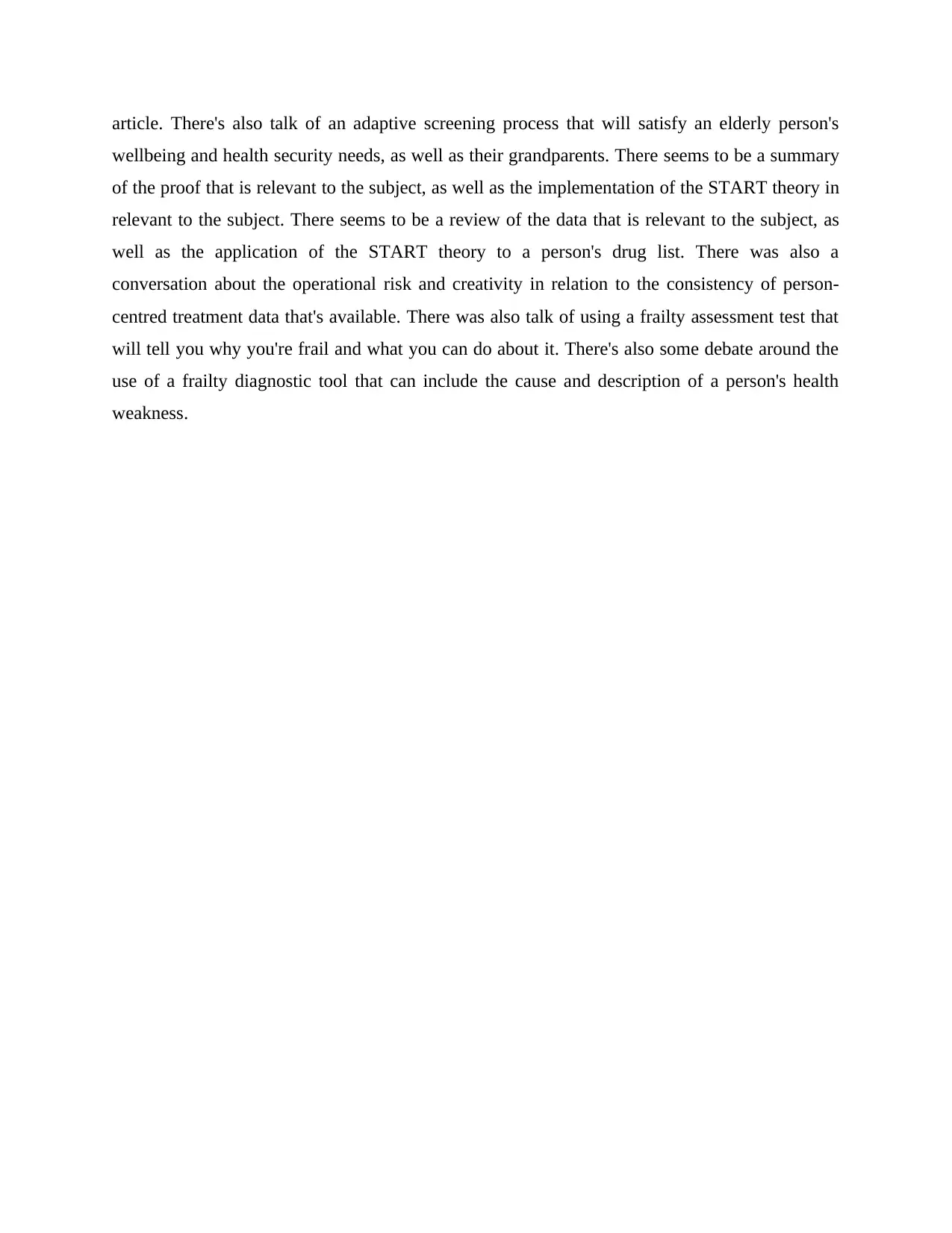
article. There's also talk of an adaptive screening process that will satisfy an elderly person's
wellbeing and health security needs, as well as their grandparents. There seems to be a summary
of the proof that is relevant to the subject, as well as the implementation of the START theory in
relevant to the subject. There seems to be a review of the data that is relevant to the subject, as
well as the application of the START theory to a person's drug list. There was also a
conversation about the operational risk and creativity in relation to the consistency of person-
centred treatment data that's available. There was also talk of using a frailty assessment test that
will tell you why you're frail and what you can do about it. There's also some debate around the
use of a frailty diagnostic tool that can include the cause and description of a person's health
weakness.
wellbeing and health security needs, as well as their grandparents. There seems to be a summary
of the proof that is relevant to the subject, as well as the implementation of the START theory in
relevant to the subject. There seems to be a review of the data that is relevant to the subject, as
well as the application of the START theory to a person's drug list. There was also a
conversation about the operational risk and creativity in relation to the consistency of person-
centred treatment data that's available. There was also talk of using a frailty assessment test that
will tell you why you're frail and what you can do about it. There's also some debate around the
use of a frailty diagnostic tool that can include the cause and description of a person's health
weakness.
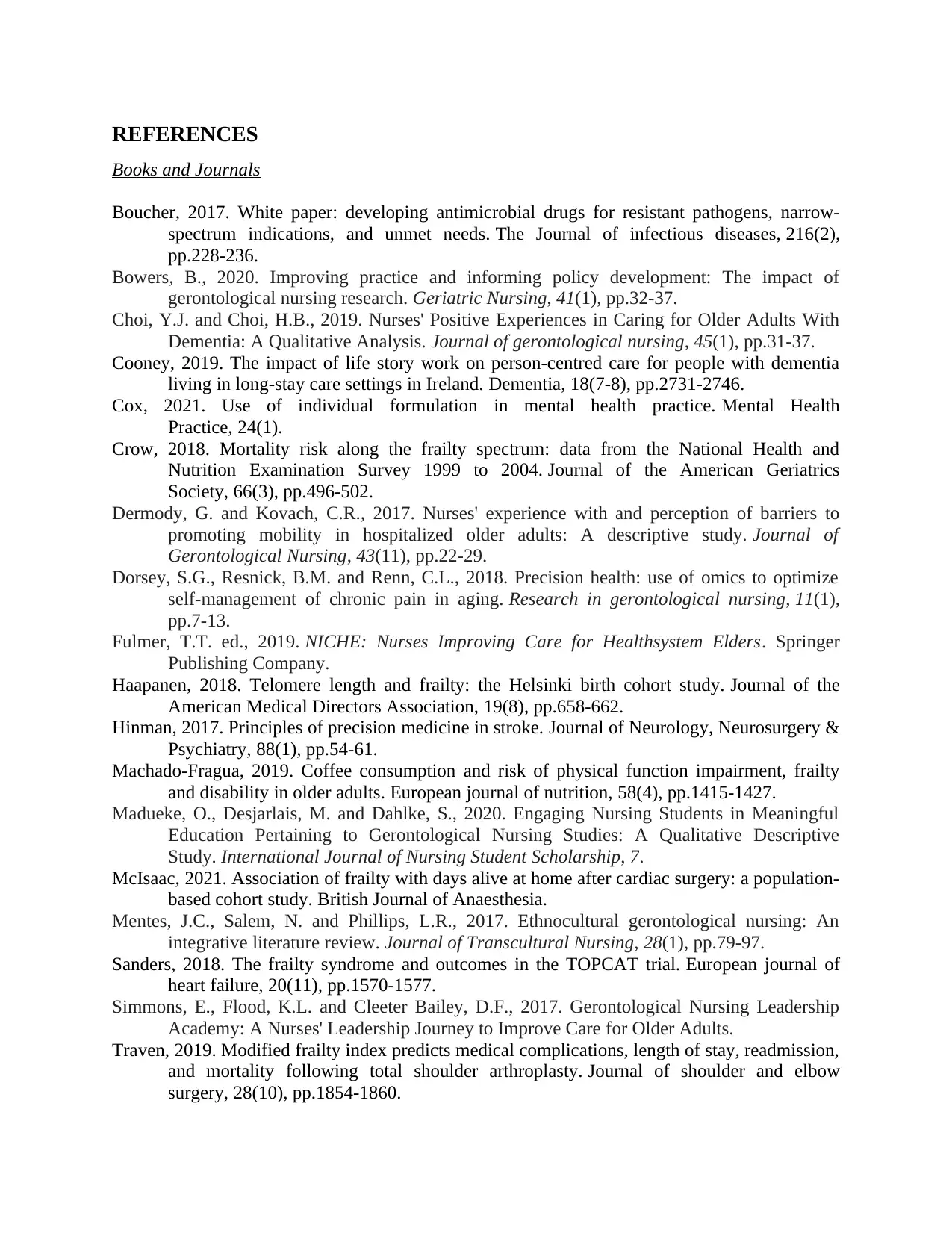
REFERENCES
Books and Journals
Boucher, 2017. White paper: developing antimicrobial drugs for resistant pathogens, narrow-
spectrum indications, and unmet needs. The Journal of infectious diseases, 216(2),
pp.228-236.
Bowers, B., 2020. Improving practice and informing policy development: The impact of
gerontological nursing research. Geriatric Nursing, 41(1), pp.32-37.
Choi, Y.J. and Choi, H.B., 2019. Nurses' Positive Experiences in Caring for Older Adults With
Dementia: A Qualitative Analysis. Journal of gerontological nursing, 45(1), pp.31-37.
Cooney, 2019. The impact of life story work on person-centred care for people with dementia
living in long-stay care settings in Ireland. Dementia, 18(7-8), pp.2731-2746.
Cox, 2021. Use of individual formulation in mental health practice. Mental Health
Practice, 24(1).
Crow, 2018. Mortality risk along the frailty spectrum: data from the National Health and
Nutrition Examination Survey 1999 to 2004. Journal of the American Geriatrics
Society, 66(3), pp.496-502.
Dermody, G. and Kovach, C.R., 2017. Nurses' experience with and perception of barriers to
promoting mobility in hospitalized older adults: A descriptive study. Journal of
Gerontological Nursing, 43(11), pp.22-29.
Dorsey, S.G., Resnick, B.M. and Renn, C.L., 2018. Precision health: use of omics to optimize
self-management of chronic pain in aging. Research in gerontological nursing, 11(1),
pp.7-13.
Fulmer, T.T. ed., 2019. NICHE: Nurses Improving Care for Healthsystem Elders. Springer
Publishing Company.
Haapanen, 2018. Telomere length and frailty: the Helsinki birth cohort study. Journal of the
American Medical Directors Association, 19(8), pp.658-662.
Hinman, 2017. Principles of precision medicine in stroke. Journal of Neurology, Neurosurgery &
Psychiatry, 88(1), pp.54-61.
Machado-Fragua, 2019. Coffee consumption and risk of physical function impairment, frailty
and disability in older adults. European journal of nutrition, 58(4), pp.1415-1427.
Madueke, O., Desjarlais, M. and Dahlke, S., 2020. Engaging Nursing Students in Meaningful
Education Pertaining to Gerontological Nursing Studies: A Qualitative Descriptive
Study. International Journal of Nursing Student Scholarship, 7.
McIsaac, 2021. Association of frailty with days alive at home after cardiac surgery: a population-
based cohort study. British Journal of Anaesthesia.
Mentes, J.C., Salem, N. and Phillips, L.R., 2017. Ethnocultural gerontological nursing: An
integrative literature review. Journal of Transcultural Nursing, 28(1), pp.79-97.
Sanders, 2018. The frailty syndrome and outcomes in the TOPCAT trial. European journal of
heart failure, 20(11), pp.1570-1577.
Simmons, E., Flood, K.L. and Cleeter Bailey, D.F., 2017. Gerontological Nursing Leadership
Academy: A Nurses' Leadership Journey to Improve Care for Older Adults.
Traven, 2019. Modified frailty index predicts medical complications, length of stay, readmission,
and mortality following total shoulder arthroplasty. Journal of shoulder and elbow
surgery, 28(10), pp.1854-1860.
Books and Journals
Boucher, 2017. White paper: developing antimicrobial drugs for resistant pathogens, narrow-
spectrum indications, and unmet needs. The Journal of infectious diseases, 216(2),
pp.228-236.
Bowers, B., 2020. Improving practice and informing policy development: The impact of
gerontological nursing research. Geriatric Nursing, 41(1), pp.32-37.
Choi, Y.J. and Choi, H.B., 2019. Nurses' Positive Experiences in Caring for Older Adults With
Dementia: A Qualitative Analysis. Journal of gerontological nursing, 45(1), pp.31-37.
Cooney, 2019. The impact of life story work on person-centred care for people with dementia
living in long-stay care settings in Ireland. Dementia, 18(7-8), pp.2731-2746.
Cox, 2021. Use of individual formulation in mental health practice. Mental Health
Practice, 24(1).
Crow, 2018. Mortality risk along the frailty spectrum: data from the National Health and
Nutrition Examination Survey 1999 to 2004. Journal of the American Geriatrics
Society, 66(3), pp.496-502.
Dermody, G. and Kovach, C.R., 2017. Nurses' experience with and perception of barriers to
promoting mobility in hospitalized older adults: A descriptive study. Journal of
Gerontological Nursing, 43(11), pp.22-29.
Dorsey, S.G., Resnick, B.M. and Renn, C.L., 2018. Precision health: use of omics to optimize
self-management of chronic pain in aging. Research in gerontological nursing, 11(1),
pp.7-13.
Fulmer, T.T. ed., 2019. NICHE: Nurses Improving Care for Healthsystem Elders. Springer
Publishing Company.
Haapanen, 2018. Telomere length and frailty: the Helsinki birth cohort study. Journal of the
American Medical Directors Association, 19(8), pp.658-662.
Hinman, 2017. Principles of precision medicine in stroke. Journal of Neurology, Neurosurgery &
Psychiatry, 88(1), pp.54-61.
Machado-Fragua, 2019. Coffee consumption and risk of physical function impairment, frailty
and disability in older adults. European journal of nutrition, 58(4), pp.1415-1427.
Madueke, O., Desjarlais, M. and Dahlke, S., 2020. Engaging Nursing Students in Meaningful
Education Pertaining to Gerontological Nursing Studies: A Qualitative Descriptive
Study. International Journal of Nursing Student Scholarship, 7.
McIsaac, 2021. Association of frailty with days alive at home after cardiac surgery: a population-
based cohort study. British Journal of Anaesthesia.
Mentes, J.C., Salem, N. and Phillips, L.R., 2017. Ethnocultural gerontological nursing: An
integrative literature review. Journal of Transcultural Nursing, 28(1), pp.79-97.
Sanders, 2018. The frailty syndrome and outcomes in the TOPCAT trial. European journal of
heart failure, 20(11), pp.1570-1577.
Simmons, E., Flood, K.L. and Cleeter Bailey, D.F., 2017. Gerontological Nursing Leadership
Academy: A Nurses' Leadership Journey to Improve Care for Older Adults.
Traven, 2019. Modified frailty index predicts medical complications, length of stay, readmission,
and mortality following total shoulder arthroplasty. Journal of shoulder and elbow
surgery, 28(10), pp.1854-1860.
⊘ This is a preview!⊘
Do you want full access?
Subscribe today to unlock all pages.

Trusted by 1+ million students worldwide
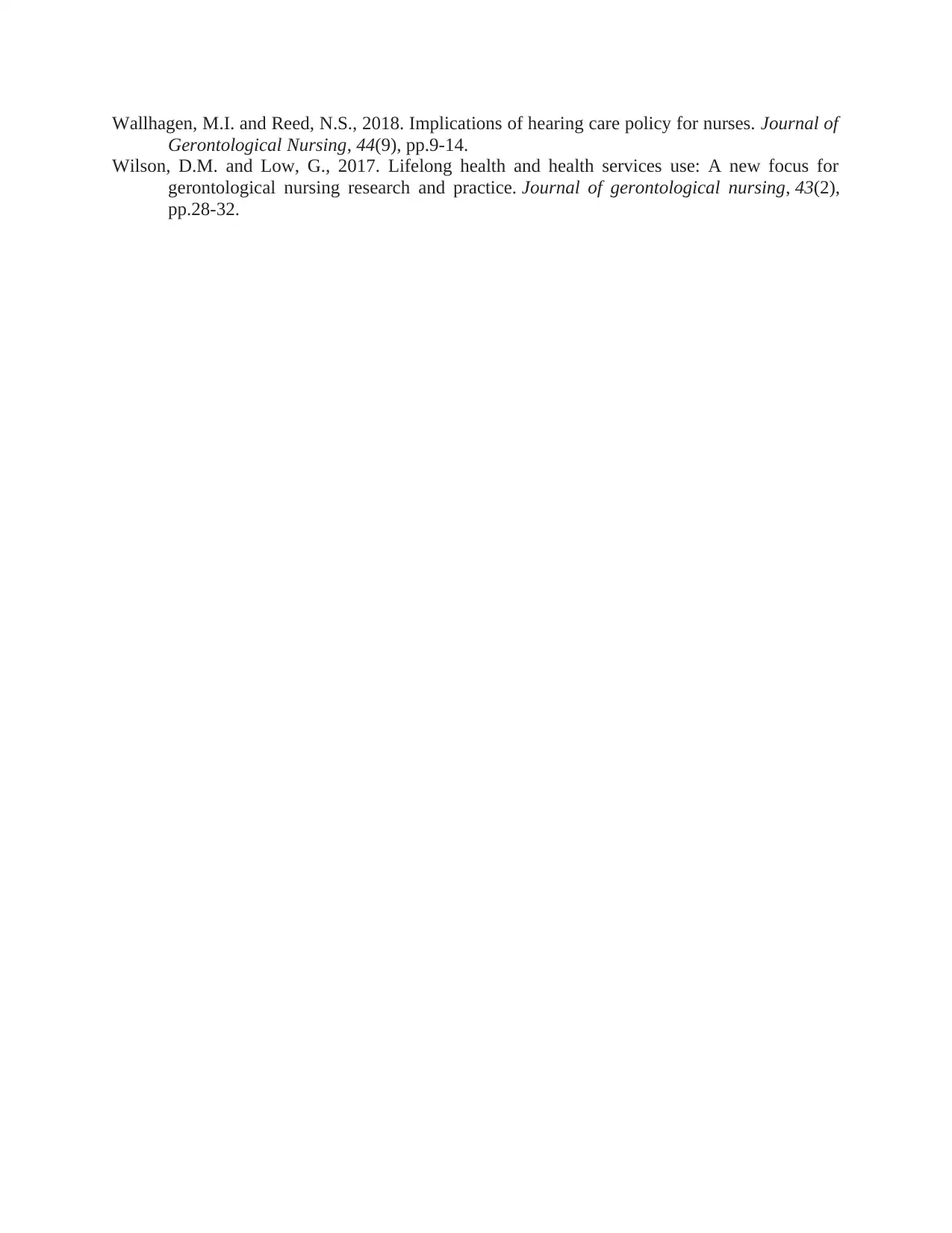
Wallhagen, M.I. and Reed, N.S., 2018. Implications of hearing care policy for nurses. Journal of
Gerontological Nursing, 44(9), pp.9-14.
Wilson, D.M. and Low, G., 2017. Lifelong health and health services use: A new focus for
gerontological nursing research and practice. Journal of gerontological nursing, 43(2),
pp.28-32.
Gerontological Nursing, 44(9), pp.9-14.
Wilson, D.M. and Low, G., 2017. Lifelong health and health services use: A new focus for
gerontological nursing research and practice. Journal of gerontological nursing, 43(2),
pp.28-32.
1 out of 10
Related Documents
Your All-in-One AI-Powered Toolkit for Academic Success.
+13062052269
info@desklib.com
Available 24*7 on WhatsApp / Email
![[object Object]](/_next/static/media/star-bottom.7253800d.svg)
Unlock your academic potential
Copyright © 2020–2026 A2Z Services. All Rights Reserved. Developed and managed by ZUCOL.





